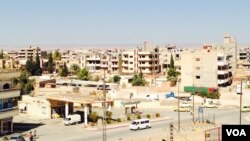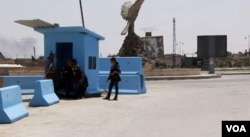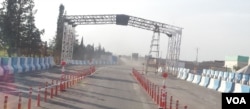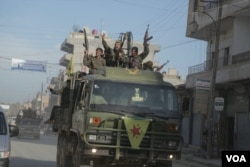This Kurdish majority area in the southeastern part of Syria is a no-man’s land and, at the same time, everyman’s land.
Crossing the border from Iraq to get here, the first checkpoint is manned by Christian militias allied with Kurd fighters. Farther west, Arab forces maintain road security.
Forces loyal to President Bashar al-Assad's regime also control parts of Qamishli, the largest city in the region.
The control of so many different forces in an area that is only 100 kilometers in radius causes confusion.
“We have to deal with this on daily basis. It is very exhausting and confusing,” said a taxi driver after passing through an Arab checkpoint.
The divisions and disorder reflect how complicated the Western coalition mission to help restore order in Syria will be. And it doesn’t speak to the dynamics elsewhere in Syria, where Russian, Iranian, Hezbollah and Syrian government forces are fighting anti-Assad and Islamic State militants in a maze of war.
A snapshot of daily life here offers a look at how difficult it is for locals to figure out who is in charge and where — even in a part of Syria where there is no fighting.
In the fallout from Syria’s civil war, people are trying to adjust to a new reality. Since the establishment of the modern Syrian state in 1920s, this region has been known to be quiet, marginalized and strategically insignificant, analysts say.
Largely neutral
Since the start of the civil war in 2011, Kurds have largely remained neutral in the fight between Assad’s regime and the opposition forces.
The war against IS has barely touched this region — except for Kurdish fighters recruiting young people for battles in IS-dominated areas some 100 kilometers to the south.
It is a far different scenario in other Kurdish-dominated cities, like Kobani and Efrin, that have been left in ruins in fighting among IS, Kurds, Syrian government forces and opposition rebels.
However, IS causes a problem for the residents of this area as well, because the group imposes taxes on goods before they arrive here. This heavy taxation makes daily staples expensive.
There is one continual reminder of IS: Pictures of Kurdish fighters killed fighting IS hang on streetlight poles in Qamishli.
To keep order and to keep IS out, the region has settled into an uneasy political and social detente that leaves security muddled and tensions simmering. In many cities, trenches built for security reasons are symbolic of an uneasy isolation.
The party that rules this canton is called the Democratic Union Party (PYD). It is closely allied with the Turkey-based Kurdistan Workers' Party (PKK) and established its rule in three cantons of Syria in 2012.
The newly established entity has not been officially recognized by the Syrian government or by any international body.
The Kurdish language, officially banned by the Syrian regime, is the lingua franca. It is spoken on the streets and is the official language of the government.
The new administration says it also recognizes Arabic and Syriac, the languages of the minority population.
'Good experiment'
“This is a very good experiment for our people,” said Salih Muslim, one of the leaders of the ruling party. “We are trying to engage every segment of our society in this unique opportunity for self-rule. Our emphasis is for people to govern themselves at the local level.”
Assad forces control the airport and checkpoints but are spread thinly in the fight against rebels, IS and others. The regime has left the Kurds mostly to themselves for the time being.
“The Assad regime is the one who still rules,” said Ibrahim Biro, the head of the Kurdish National Council, a political group that opposes the PYD. “The regime is still strong here.”
Biro said Kurdish factions must unite to keep the Syrian regime at bay.
“Unity is the only way to protect Syrian Kurdistan,” he said.
In the town of Amuda, about 30 kilometers west of Qamishli, many locals voice the same concern.
“The situation here is unclear,” said local journalist Barzan Sheikhmous, who closely follows patterns of governance in the region. “The regime is still present and strong. They [the Syrian regime] still pay salaries to public workers and provide flour to local bakeries.”
PYD leaders say the presence of the regime in the area is insignificant.
“They don’t have any power over us,” Muslim told VOA. “However, we need to differentiate between the regime and state institutions. It is in our interest to keep these institutions intact to serve our people.”
Hoping for autonomy
Kurds are hoping that when the Syria situation gets resolved, they will have full autonomy.
“This canton system is only provisional,” Muslim said. “Things will change soon. Federalism is the best option for all Syrians.”
For now, locals watch news reports of the war in other parts of Syria on television. As they go about their daily lives, they hear no shots and see no blood.
As a scene from a battle in Idlib unfolded on television in a popular restaurant, the owner said the locals watch it like those living abroad.
“The war sounds very far away from here. For now, people here only care about what is happening in our region,” he said as he placed new covers on the tables.







